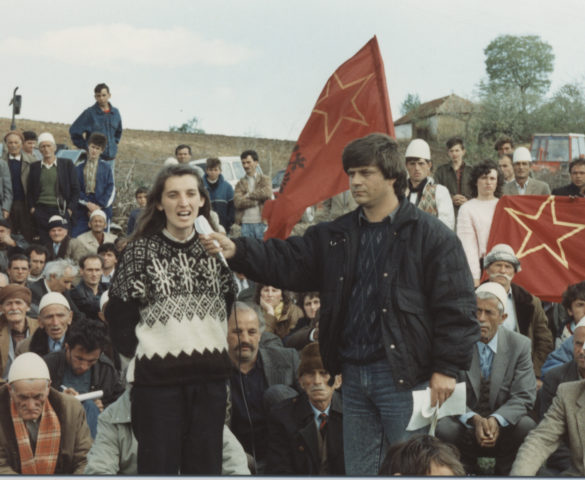This collection was created and is maintained by the Kosovo Oral History Initiative (KOHI). KOHI was founded in 2012 through a collaboration between the Kosovo Women’s Network and Anna Di Lellio, professor at The New School, NY, along with students from the graduate program in International Affairs. The project quickly developed into an independent NGO, which continues collaborations with universities and institutions in the United States and Europe. KOHI is comprised of researchers of various generations, nationalities, and professions, and its mission is to record personal accounts that intersect with Kosovo’s broader history and with world events. These materials include oral interviews with women activists, thus chronicling the history of women’s activism as remembered and interpreted by the activists themselves.
Albanian women in Kosovo have often served more than a mere side role in politics. Even in the most recent past, it is evident that women were present in the underground national movement. Women’s efforts were pivotal in acts of peaceful resistance against the regime through their roles as teachers, doctors, and nurses within the health care institutions in Kosovo, and also contributed as political activists through their efforts as both women’s rights and human rights advocates. Stories collected by KOHI reveal the extraordinary agency of Kosovan women over the past decades, which contradicts perceived ideas of men’s dominance over women. Similar to elsewhere in the world, patriarchy is still hegemonic within Kosovo. Still, Kosovan women have fought for their own rights and the rights of others, and describe their experiences with a passion and dedication that upends stereotypes. Today, women comprise 30 percent of Kosovo’s legislature by law, and Kosovo elected the first female president in the Balkans, Atifete Jahjaga (2011–2016).
Whether engaged in protests against the regime, in campaigns to promote girls’ literacy, in nationalist movements, in acts of resistance against Milošević, or in the fight for women’s rights across ethnic divisions, women have provided vivid personal accounts that intersect with the broader historical events of the time. The oral interviews in the collection have a biographical structure because they focus on the personal lives of interviewees. Interviews in the Women’s Activism in Kosovo collection track the lives of the women involved in women’s emancipation projects in Yugoslavia after World War II, Ilegalja [Underground Movement], and peace activism efforts in the 1990s.
As forms of activism, pamphlets, newspapers, self-help groups, and women’s own forces of persuasion and creativity were used. Many activists created NGOs (like that of Drita Vukshinaj for people with disabilities, and Vjosa Dobruna’s Center for the Protection of Women and Children). Many women served as activists without outside assistance or financial support from donors.

